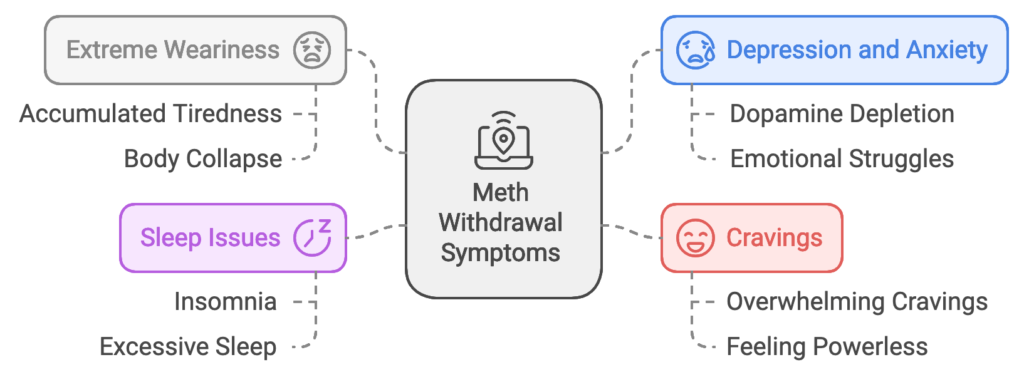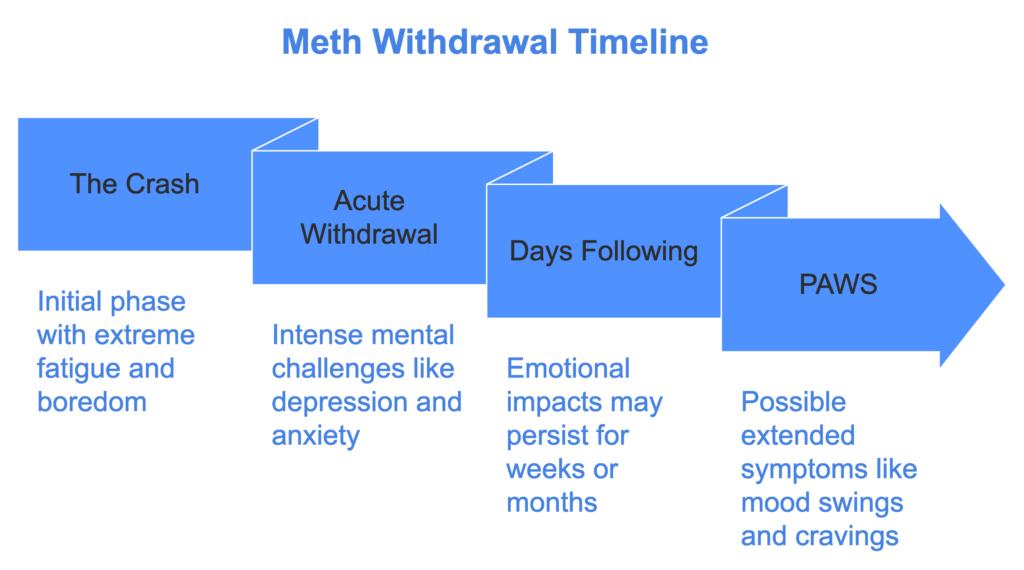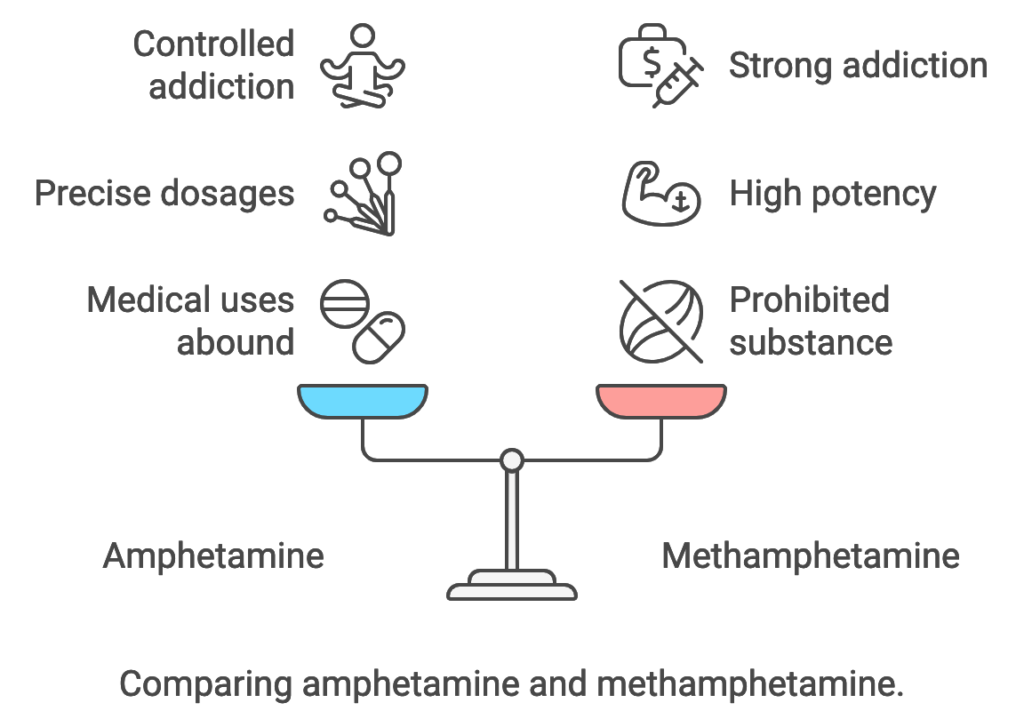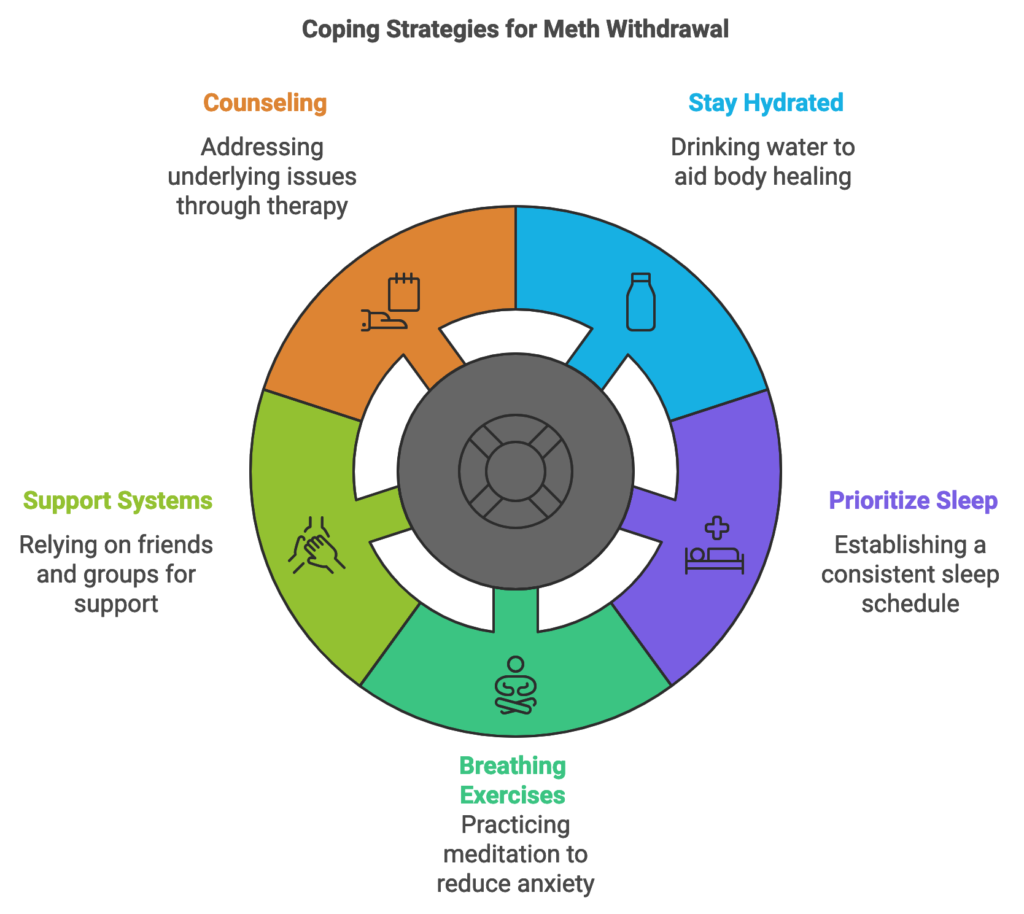You are thus considering giving up meth. Let me say—both physically and metaphorically, it’s one wild journey. Among the most strong and addicting narcotics available, methamphetamine, sometimes known as “meth,” Still, the issue is you can stop. The road truly begins here in knowing meth withdrawal symptoms and being ready for the detox. Though it will not be simple, you can get through with the correct support and will.
What is Meth? (And Why Is It So Addictive)?
Not your typical stimulant, methamphetamine grabs your brain aggressively. You might ask, “What’s the big difference between amphetamine and methamphetamine?” Though they sound alike, meth is far more potent and addictive. Meth raises your dopamine levels to produce a strong, happy high. But after that high wears off, you start to need more, which fuels a very difficult cycle of reliance.
This goes beyond simply feeling “good”—meth rewires the reward system in your brain, which makes you feel as though you need it to operate. Meth use damages all aspect of your life over time—mentally, physically, and emotionally. The truth is, however, you can recover your life from meth addiction.
The Meth Rollercoaster of Withdrawal Symptoms

Let’s address withdrawal. Though it’s hardly a stroll in the park, this is a necessary step toward meth free. When you quit utilizing, you should expect:
Extreme Wearyness
On meth, you find yourself running for days without sleep. Your body so collapses hard when you stop. Imagine all that accumulated tiredness at last catching up—it’s like tons of bricks all at once.
Depression and Anxiety
Meth sends dopamine, the “feel-good” neurotransmitter into your brain. Stopping causes that dopamine to be depleted and causes your brain to fight to generate it on its own. You may so become melancholy and nervous.
Despites
Your brain will not quit pleading; it craves meth. Often overwhelming, these desires make one feel as though they are powerless to resist.
Issues with Sleep
Not sleeping? alternatively sleeping far too much? Having been driven to extremes, your body is out of sync and finds a natural rhythm difficult.
How Long Do Symptoms of Meth Withdrawal Last?
Meth withdrawal differs from person to person; it does not follow any one schedule. Generally anyway, here’s what to expect:

First Through Three Days: The Crash
The most powerful phase is this one. You will feel totally out of it, bored, and depleted. Over these first days, expect poor energy levels and extreme tiredness.
Days Four to Ten: Acute Withdrawal
This is when the cerebral side truly takes front stage. Often the toughest obstacles are depression, anxiety, strong cravings, and sleep problems. Some people can have this intense phase even longer.
Days Following
The mental impacts of despair and anxiety can last weeks or even months, even while the worst physical symptoms could go away. Remember: these emotions are transitory; with help, they will progressively become better.
PAWS (Post-Acute Withdrawal Syndrome) can also manifest for certain people, extending symptoms like mood swings and cravings. Once more, though, these symptoms are not permanent.
Meth Detox: Are You Able to Do It at Home?
Many wonder whether they could detox from meth at home. The response is _ Technically, yes—but it is not advised. Particularly if you live alone, detoxing without medical supervision might be dangerous. Professionals working in a medical environment can assist control meth withdrawal symptoms by offering both mental and physical support during trying circumstances.
If you intend to perform it at home, be sure someone else is present to assist should things grow heated. Having a strategy for controlling urges and any arising symptoms is also wise. Recall: detoxing is about preparing yourself for a successful recovery, not only about clearing drugs from your body.
What Distinguishes Amphetamine from Methamphetamine?

Though they are clearly not the same, many people mix amphetamine and methamphetamine. Consider amphetamines, sometimes found in ADHD drugs as the “milder cousin” of meth. Medical uses abound, and dosages are precisely controlled.
Conversely, meth is prohibited and significantly more strong. Its effects linger in the brain and strike more powerfully. Addiction to methamphetamine is rather strong, and although breaking free from it will not be easy, it is one you can conquer with appropriate treatment.
The Value of Encouragement During Methamphetamine Withdrawal
Finding support is among the most important elements of meth withdrawal and rehabilitation. Dealing with this procedure by yourself can make one feel overwhelmed and even unable. It makes a big difference, though, when you have individuals who know what you are going through.
Groups like Narcotics Anonymous (NA) provide a safe environment where members assist one another in remaining clean and share their stories. From firsthand knowledge, NA saved my life. Being surrounded by people who “get it” lessens the isolation of the trip and provides support and advise when you’re having trouble.
Coping Strategies During Meth Withdrawal
Although quitting meth is difficult, there are steps you may take to help the process go somewhat more smoothly:

- Stay Hydrated: Meth can cause your body to lose fluids, hence drinking enough of water will enable your body to begin to heal itself.
- Prioritize Sleep: Your body needs time to heal. Though it will be difficult, try to establish a consistent sleeping schedule.
- Practice Breathing Exercises and Meditation: These can help you stay grounded throughout trying circumstances and aid to lower anxiety.
- Lean on Support Systems: Friends, relatives, or support groups like NA can give you the boost you need.
- Seek Counseling or Therapy: This will enable you to resolve underlying problems causing meth use, so providing a stronger basis for recovery.
In Summary: You Got This!
Meth pull-off that’s horrible; there is no question about that. But it also marks the first step towards recovering your life. Remember that methamphetamine withdrawal is transient; stay focused; avoid trying to tough it out on your own. Your healing, though, spans a lifetime.
You win every day you remain clean. Your brain will begin to mend finally; the cravings will recede, the depression will vanish. One day at a time, lean on your support system and believe you have the will to overcome this. Though meth can be strong, you are more robust. One step, one day at a time—keep pushing ahead.

